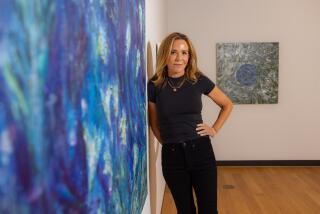DOWNTOWN
- Share via
Following the tradition of Japanese “Mu” or Zero paintings, Kyoko Maruta’s coolly meditative abstractions are based on the Taoist principle of representing the void through the accentuation of positive space. The work thus tends to revolve around the yin-yang ambiguities of subject and object, figure and ground, creating a catalyst for material (and, hopefully, mental) transcendence.
In 1982, the Japanese-born Maruta moved to New York and her work has subsequently absorbed many of the tenets of Western expressionism, particularly the significance of the brush stroke as a statement of artistic ego and emotional gesture. This meeting of East and West tends, as one might expect, to mute the more extreme (and vital) characteristics of the two philosophies. The work is emotive without being rambunctious, modest without being stylistically introverted or obscure.
In the series of five paintings called “Substantial Void,” for example, Maruta isolates a sweeping, Lichtenstein-like brush stroke in various blues, grays and whites against an amorphous pale blue background. This controlled gesture is offset by the intrusion of hard-edge, geometric shapes in silver which serve to both stabilize the form and partly displace it. It is unclear whether the stroke is a positive statement against a negative background, or represents a sort of painterly black hole stretching into a formless infinity.
Such structural contradictions could be seen as a metaphor for the conflict between modernist and Zen aesthetics, between the autonomy of the object and its conceptual negation. Maruta’s delicate balancing act ultimately fails because it is upset by the self-conscious bravura of its own artifice. We become distracted by the dynamics of process and composition rather than absorbed by the transcendent idea. Maruta’s oeuvre thus exploits the outward trappings of western art without absorbing its true vitality or resonance. (James Turcotte Gallery, 3517 W. 6th St., to March 30.)
More to Read
The biggest entertainment stories
Get our big stories about Hollywood, film, television, music, arts, culture and more right in your inbox as soon as they publish.
You may occasionally receive promotional content from the Los Angeles Times.










